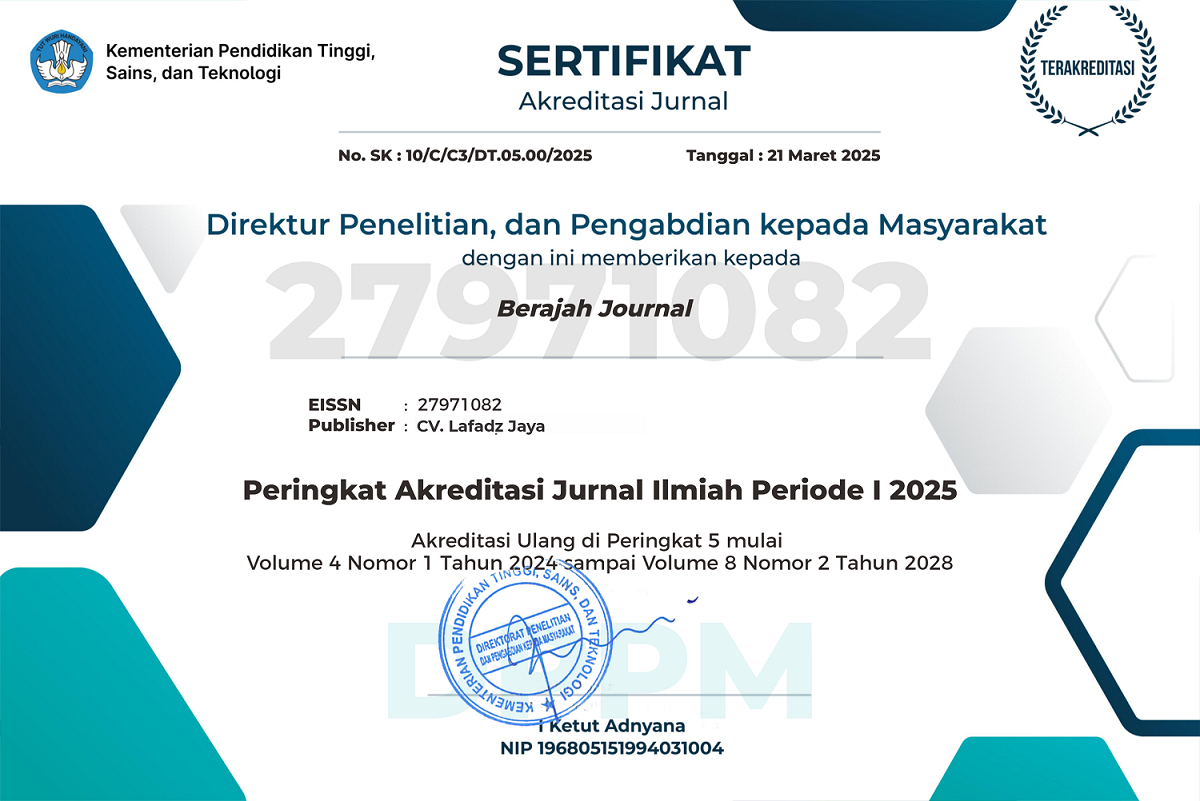MEDIASI KEPUASAN KERJA PADA PENGARUH STRESS KERJA TERHADAP TURNOVER INTENTION KARYAWAN
DOI:
https://doi.org/10.47353/bj.v4i4.374Keywords:
Job Satisfaction, Job Stress, Turnover Intention, SEM-PLSAbstract
This research aims to examine the influence of work stress and the mediating role of job satisfaction on employee turnover intention at the Anumana Ubud Hotel. This study involved 98 respondents selected using the total sampling method. Data was collected via a Likert scale questionnaire and analyzed using SEM-PLS. Hypothesis testing was carried out with a one-sided t-test. The research results show that work stress has a significant positive influence on turnover intention, as well as a significant negative influence on employee job satisfaction. Apart from that, job satisfaction has a significant negative effect on turnover intention. Job satisfaction acts as a partial mediator in the relationship between job stress and turnover intention. This research model has a predictive relevance (Q2) of 0.514 which is considered strong.
Downloads
References
Adi, I. N. R., & Saputri, L. G. E. A. (2024). Examining the Determinants of Customer Satisfaction in Medicine and Health Device Distributors. Journal of Social Work and Science Education, 5(1), 360-368. https://doi.org/10.52690/jswse.v4i2.416
Adi, I. N. R., Ariesandi, N. M. A., Mulyadi, D., & Saputri, L. G. E. A. (2023). Mediation of motivation on communication equity and influence organizational commitment to employee performance. Jurnal Mantik, 7(2). https://doi.org/10.35335/mantik.v7i2.4001
Akter, S., D'Ambra, J., & Ray, P. (2011). An evaluation of PLS based complex models: the roles of power analysis, predictive relevance, and GoF index. Proceedings of the 17th Americas Conference on Information Systems (AMCIS2011), 1-7.
Allalm, A. L., & Alsim, M. (2019). Relationship between job satisfaction and turnover intention. International Journal of Human Resource Studies, 9(2), 163.
Bagozzi, R. P., & Yi, Y. (1988). On The Evaluation of Structural Equation Models. Journal of the Academy of Marketing Science, 16(1), 74-79.
Chin, W. W. (1995). Partial Least Square is to LISREL as Principal Components Analysis is to Common Factor Analysis. Technology Studies.
Dirga Pranata, G., & Salit Ketut Netra, G. (2019). Pengaruh Stres Kerja Terhadap Turnover Intention Melalui Mediasi Komitmen Organisasional Pada Restoran Queen’s Tandoor Seminyak. E-Jurnal Manajemen, 8(6), 3531-3559. https://doi.org/10.24843/EJMUNUD.2019.v08.i06.p09
Fauzi, A. L., Wulalandari, A. L. S., Cahyani, D. R., Nurfitri, N., Khalilani, N., Deva, R., & Nursalfitri, S. (2022). Pengaruh Kepuasan Kerja dan Stres Kerja Terhadap Turnover Intention Pada Karyawan. Jurnal Ilmu Manajemen Terapan, 4(2), 229-241.
Ghozali, I., & Latan, H. (2015). Konsep Teknik Aplikasi Menggunakan Smart PLS 3.0 Untuk Penelitian Empiris. BP Undip.
Hair, J. F., Risher, J. J., Sarstedt, M., & Ringle, C. M. (2019). When to Use and How to Report the Results of PLS-SEM. European Business Review, 31(1), 2-24.
Hair, J. F., et al. (2017). A Primer on Partial Least Squares Structural Equation Modeling (PLS-SEM). SAGE Publications.
Halimah, T. N., Falthoni, A. L., & Minalarsih, M. M. (2016). Pengaruh Job Insecurity, Kepuasan Kerja, dan Lingkungan Kerja Terhadap Turnover Intention Pramuniaga di Gelalel Supermarket. Journal of Management, 2(2).
Hardjana, A. L. M. (2006). Stres Tanpa Distres: Seni Mengolah Stres. Kanisius.
Henseler, J., Ringle, C. M., & Sarstedt, M. (2015). A New Criterion for Assessing Discriminant Validity in Variance-based Structural Equation Modeling. Journal of the Academy of Marketing Science.
Mangkunegara, A. P. (2018). Manajemen Sumber Daya Manusia Perusahaan. Remaja Rosdakarya.
Mitha Indri Pratiwi, & Muhammad Roni Indarto. (2022). Pengaruh Stres Kerja Terhadap Turnover intention Dengan Kepuasan Kerja Sebagai Variabel Mediasi. Jurnal Cakrawangsa Bisnis, 3(2), 221-236. http://journal.stimykpn.ac.id/index.php/cb
Pelliyezer Karo Karo, M. I. Djohan, & Meyke Amalia. (2023). The Influence Of Job Satisfaction On Turnover Intention Of Event Workers In Palembang City. Maker: Jurnal Manajemen, 9(1), 51-62.
Pralyogi, M. A., Koto, M., & Arif, M. (2019). Kepuasan kerja sebagai variabel intervening pada pengaruh work-life balance dan stres kerja terhadap turnover intention. Jurnal Ilmiah Manajemen dan Bisnis, 20(1), 39-51.
Rijalsawitri, D. P., & Sualnal, I. W. (2020). Pengaruh Kepuasan Kerja, Stres Kerja, dan Lingkungan Kerja Non Fisik Terhadap Turnover Intention. Doctoral Dissertation, Udayana University.
Ruxton, G. D., & Neuhauser, M. (2010). When Should We Use One-tailed Hypothesis Testing? Methods in Ecology and Evolution, 1(2), 114-117. https://doi.org/10.1111/j.2041-210X.2010.00014.x
Salisbury, W. D., Chin, W. W., Gopal, A., & Newsted, P. R. (2002). Research Report: Better Theory through Measurement Developing a Scale to Capture Consensus on Appropriation. Information System Research, 13, 91-103.
Sofia Andi Dewi, & Ayu Sriathi. (2019). Pengaruh Stres Kerja Terhadap Turnover Intention yang Dimediasi Oleh Kepuasan Kerja. E-Jurnal Manajemen, 8(6), 3646-3674. https://doi.org/10.24843/EJMUNUD.2019.v08.i06.p3646
Stanlie Andrian Noeary, Albert Kurniawan Purnomo, & Fotuho Waruwu. (2020). Kepuasan Kerja Sebagai Variabel Mediasi Pada Pengaruh Stres Kerja Terhadap Niat Keluar. Jurnal Manajemen Maranatha, 20(1), 31-40. https://journal.maranatha.edu/index.php/jmm
Supriyanti, N. I. P. J., & Mayasari, N. M. D. A. (2022). Pengaruh Stres Kerja dan Kepuasan Kerja Terhadap Turnover Intention Karyawan Bagian Produksi Pt. Akar Wangi Kabupaten Gianyar. Bisma: Jurnal Manajemen, 8(2), 321-330.
Syarifah Mirza Lestari, & Achmad Sudiro. (2023). Pengaruh Stres Kerja Terhadap Turnover Intention Dimediasi Oleh Kepuasan Kerja. Jurnal Ilmiah Mahasiswa Fakultas Ekonomi dan Bisnis, 9(2), Universitas Brawijaya Malang.
Downloads
Published
How to Cite
Issue
Section
License
Copyright (c) 2024 I Nyoman Rasmen Adi, Luh Gede Elvina Adi Saputri, Made Mulyadi, I Wayan Meryawan

This work is licensed under a Creative Commons Attribution 4.0 International License.






















